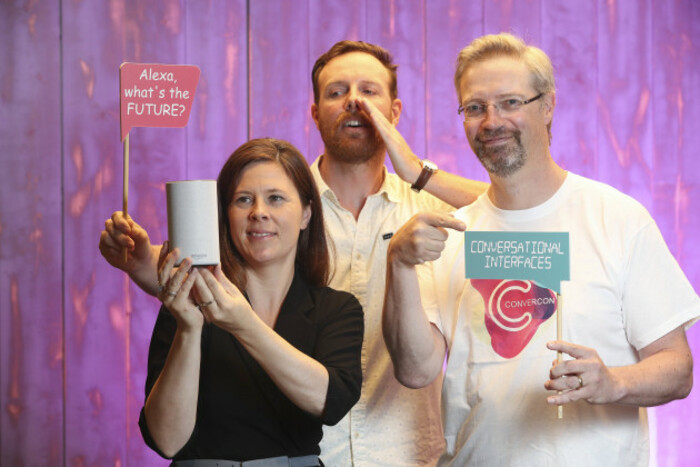The Dublin startup that's fine-tuning customer service... using artificial intelligence
As part of our weekly Startup Spotlight series, we profile Webio.
DUBLIN’S WEBIO HAS been on the front lines of the dramatic changes in how businesses interact with customers over the past few years.
The two-year-old startup describes itself as a ‘conversational middleware’ company that designs software for messaging services in order to make sense of information flowing between companies and their customers.
The original idea for the company was to create AI tools that helped call centres better manage customer queries by more effectively routing responses and making preemptive decisions.
However Webio found itself shifting its focus many times over to keep pace with the constantly changing world of communications.
Those changes have come as apps like WhatsApp and Facebook Messenger have become more powerful as tools for customer interaction and engagement, Webio’s co-founder and executive vice president of product, Paul Sweeney, explains.
 Paul Sweeney
Paul Sweeney
New avenues have also been opened up for companies to automate some of their customer service functions, with software ‘bots’ being used to answer basic queries and triage others.
“This caught our attention when we saw Facebook Messenger and we saw some of the stats come out around (it),” Sweeney says.
“It seemed to us that basically Facebook Messenger had a ton of the capability and none of the delivery costs (of other messaging systems).”
Sweeney says he sees a big opportunity in the application-to-person (A2P) market, which refers to chatbots in apps conversing with users or performing simple functions like delivering an automated message from a dentist to remind about an appointment.
Meanwhile, WhatsApp recently launched a new paid-for service for enterprise users to respond to and interact with customer messages using the platform.
Curve balls
Webio, which has 13 staff working around the country and is led by chief executive Cormac O’Neill, bagged €2.5 million to get the ball rolling in 2016. The investment came from US IT services firm Cameo Global and Enterprise Ireland.
The funding gave the company the time it needed to work on early architectural design, plotting how its software would work, what information it would need to process and how it could be scaled in the future.
“We actually got everyone in a room and spent three months on architectural design before we put one bit of code down,” Sweeney says.
“If you have to retrofit (features), you’ve got a lot of problems, so we spent a number of months on the architecture, building out our use case, figuring out what’s going to happen.”
Around that time, Webio also needed to react to the growing popularity of Amazon’s Alexa, as well as other personal voice assistant technologies like Siri.

While previously the Irish startup was focused purely on text communications between firms and their customers, the opportunity presented by voice-based interaction was too big to ignore.
“We saw that clearly Alexa was gaining traction,” Sweeney says.
“Actually this is a lot more than just chatbots. This is about conversational interfaces. When you’re chatting back and forth, you’ve got to be able to understand what that person is saying.”
It could be a massive gamble yet. While voice assistants have taken off – 39 million people in the US own some kind of smart speaker device – a report by The Information this week claimed that very few people actually use Alexa to make purchases online.
Enterprise problems
Nevertheless, Webio believes it now has a firmer grasp on how deep the opportunity could go. It’s targeting large enterprise customers as “they’re the ones with the biggest problem”.
Webio, Sweeney says, is helping bigger companies manage the flow of messages coming in and exploring ways of integrating more features into customer messaging, such as payments.
“(The industry is) at early stages for everything, so there’s a ton of stuff that isn’t tremendously well done or well designed and thought out. Big companies can’t make these mistakes, they have to do everything properly.”
The company has secured 22 customers globally so far in sectors like financial services, retail and utilities. Its business model is based on charging customers a licensing fee based on their transaction volumes.
Despite being based in Dublin, Webio is only now starting to work with businesses in its home market.
Earlier this year, Webio partnered with Limerick’s Avvio, which makes under-the-bonnet booking software for hotels to take their own reservations rather than relying on third-party sites like Booking.com.
The duo created a messenger-embedded bot for Fota Collection, the firm behind the Fota Island resort and Kingsley Hotel in Cork. It allows users to search for and pay for rooms, dinner or the spa.
“This is reconnecting the hotels to their customers and then connecting the customers back into the various facilities that the hotel is offering,” Sweeney says.
ConverCon
Keeping open lines of communication with other tech companies who may one day serve as partners is another important area for Webio.
The startup is now running its own mini conference on chatbots and conversational interfaces to build more links between firms, startups and developers. A sponsorship deal with Microsoft has helped cover the event.

“We were looking at a few chatbot conferences in San Francisco and Germany and other places, and we couldn’t afford either the time or the costs to go there and bring our team over,” Sweeney says.
“We foolishly said we could probably just run our own conference and get as much benefit out of it – and we wouldn’t the sideshow, we’d be the main show.”
Sweeney says the presence of many of the world’s biggest tech companies in Dublin was also an obvious aid when pulling together speakers. The city’s size makes it easy to get big and small players together in a room, he adds.
“You could get the platform players, designers, and customers all talking about what they need for this to work.”
Webio’s own future aspirations are to go global, although it expects to raise more investment in order to realise that goal.
“Our major ambitions is to push through in the UK. We’d like to push into the States but that’s going to take a little while to get organised,” Sweeney says.
“We fully expect to be in a €5 million funding round. That would be the next natural number for us, and that would be on our path to a €15- to €20-million funding round after that.”
Webio is already “well on the path to securing” that first €5 million, Sweeney adds.
The company needs to be prepared for anything that comes down the line: “When you look at the future, some weird things are possible.”
Clarification: A quote in this piece has been amended to clarify its meaning. Webio’s number of customers has also been updated.







